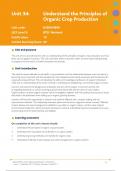Exam (elaborations)
Principles of Organic Crop Production
- Module
- Institution
Unit 34: Understand the Principles of Organic Crop Production Unit code: D/600/9849 QCF Level 3: BTEC National Credit value: 10 Guided learning hours: 60 Aim and purpose This unit aims to provide learners with an understanding of the principles of organic crop production and how these can...
[Show more]












